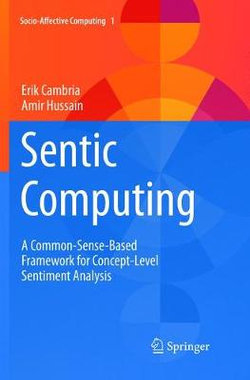Concept-level sentiment analysis goes beyond a mere word-level analysis of text in order to enable a more efficient passage from (unstructured) textual information to (structured) machine-processable data, in potentially any domain.
Readers will discover the following key novelties, that make this approach so unique and avant-garde, being reviewed and discussed:
* Sentic Computing's multi-disciplinary approach to sentiment analysis-evidenced by the concomitant use of AI, linguistics and psychology for knowledge representation and inference
* Sentic Computing's shift from syntax to semantics-enabled by the adoption of the bag-of-concepts model instead of simply counting word co-occurrence frequencies in text
* Sentic Computing's shift from statistics to linguistics-implemented by allowing sentiments to flow from concept to concept based on the dependency relation between clauses
This volume is the first in the Series Socio-Affective Computing edited by Dr Amir Hussain and Dr Erik Cambria and will be of interest to researchers in the fields of socially intelligent, affective and multimodal human-machine interaction andsystems.



Share This Book: